Threats to Vultures & Vulture Conservation
- Richprins
- Committee Member
- Posts: 75964
- Joined: Sat May 19, 2012 3:52 pm
- Location: NELSPRUIT
- Contact:
Re: SA experts save 9 endangered vultures
Please check Needs Attention pre-booking: https://africawild-forum.com/viewtopic.php?f=322&t=596
- nan
- Posts: 26310
- Joined: Thu May 31, 2012 9:41 pm
- Country: Switzerland
- Location: Central Europe
- Contact:
Re: SA experts save 9 endangered vultures
well done 
Kgalagadi lover… for ever
https://safrounet.piwigo.com/
https://safrounet.piwigo.com/
Re: SA experts save 9 endangered vultures
This story illuminates the best and worst sides of humans. Whenever I get too down on the human race, I remind myself of selfless, giving, caring souls such as these. Thank you, to all those who never get any publicity, but continue in their silent efforts to live UP to their full capacity as living beings sharing this planet. We need more like you heroes amongst us.
- Lisbeth
- Site Admin
- Posts: 67388
- Joined: Sat May 19, 2012 12:31 pm
- Country: Switzerland
- Location: Lugano
- Contact:
Africa’s reviled vultures are being hunted to the brink
Africa’s reviled vultures are being hunted to the brink
Vultures are rarely viewed as the poster boys and girls of the natural world. They have repulsive eating habits and are strikingly ugly. Nevertheless, they play a critical role in maintaining the ecological health of many parts of the world.
Vultures consume animal carcasses more effectively than any other scavengers and because their digestive juices contain acids that neutralise pathogens such as cholera and rabies they prevent diseases spreading.
They act as dead-end hosts for numerous unpleasant ailments. But many ecologists are now warning that vultures across the planet are under serious threat thanks to habitat loss, deliberate and accidental poisoning, and use of the birds’ body parts as traditional medicine cures.
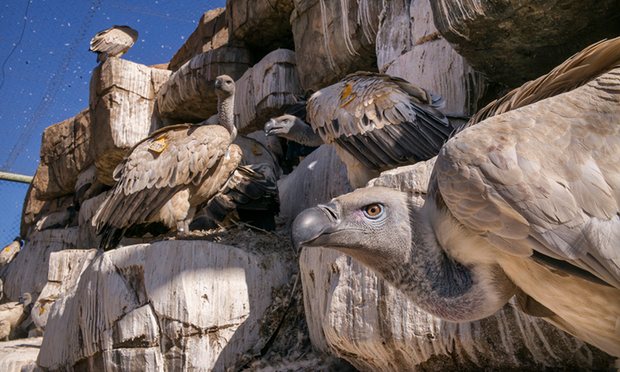
Cape vultures at their artificial nesting cliff at the VulPro facility in Magaliesburgcorrect, South Africa. Photograph: Charlie Hamilton James, Charlie Hamilton James, Charlie Hamilton James, Charlie Hamilton James/© Charlie Hamilton James
All these risks will be emphasised by British photographer Charlie Hamilton James in a series of images that will be shown as part of the Wildlife Photographer of the Year exhibition, which opens at the Natural History Museum this week.
His photographs of vultures – and the growing environmental risks that threaten to wipe them out – have won Hamilton James the exhibition’s wildlife photojournalist of the year award.
“I like underdogs,” he said last week. “That is why I like vultures. The trouble is that vultures are now under such stress in the wild – for several reasons. They are facing a massive catastrophe yet they do so much for the environment and do so much to contain disease.”
Vultures are one of the fastest declining groups of animals in the world. In India, all nine species of the bird are threatened with extinction, largely through the indiscriminate use of diclofenac, a common anti-inflammatory drug administered to livestock but which is lethal for the vultures that eat the corpses of cattle.
“There is now a real danger that a disease like rabies will spread because there are hardly any vultures left to clean up corpses left in the open,” Hamilton James said.
In Africa – where vulture losses are expected to reach 70% to 97% over the next 50 years – the causes are more varied. One key factor is poisoning, both accidental and deliberate. Poachers use poison to kill elephants and rhinos – and to kill vultures to stop them circling in the skies over dead prey and alerting gamekeepers to the presence of dead animals and the poachers. “That is a major threat,” said Hamilton James.
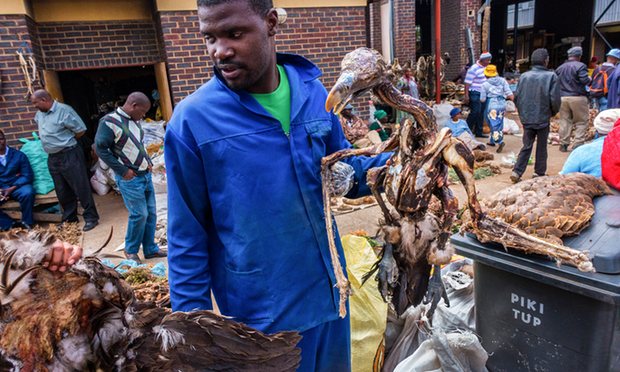
A market trader offers the body of a lappet-faced vulture at the Faraday muthi market in Johannesburg. Photograph: © Charlie Hamilton James
Another factor in southern Africa is the use of vulture body parts in traditional medicine – known as muthi – as cures and treatments for a number of ailments and as sources of improved strength, speed and endurance.
“Vulture brains are also dried, mixed with mud and smoked because it is thought that helps you see into the future,” said Hamilton James.
In one of his most telling images, a trader is seen selling the body of an endangered lappet-faced vulture at a muthi market in Johannesburg. “The market was full of bits of elephant, leopard, lion, snakes, owls, eagles and ostrich, as well as lots of plants,” said Hamilton James.
The skin of a pangolin, the most trafficked species in the world, is also visible in the photograph.
Vultures can also be poisoned accidentally. Herders in Africa often lace dead cattle with poison in order to kill lions and other predators that raid their herds. The poison goes through the systems of both cattle and predator and is eaten by vultures, which then die.
Habitat loss – caused by the spread of farming and city suburbs in Africa – is another critical factor in falling vulture numbers as is industrial and agricultural pollution. Power lines, which are spreading across the continent, also pose a risk, with birds flying into them on a regular basis.
The crisis facing vultures is exacerbated by the fact that the birds develop very slowly. Vultures do not reach sexual maturity until they are between five and seven years old. They also breed slowly, with female birds laying only a single egg every one or two years. Each new chick is therefore critical to the survival of thespecies.
Several conservation groups are now working to try to save the world’s vultures, as is revealed in Hamilton James’s photographs. They include the Namibian Vulture Project, which monitors endangered lappet-faced vultures in the Namib-Naukluft national park. The aerial survey takes four days and the plane travels 3,000km (1,865 miles).
Active nests are identified and GPS coordinates sent to ground crews who check the nest with a car mirror extension – so as not to disturb any chicks – and then ring any they find.
In South Africa, workers at the VulPro vulture conservation programme treat poisoned vultures with atropine and charcoal to try to help them recover. It is hard work, however. In 1922, the population of the local white-backed vulture was thought to be around 270,000. In 2015, it was 9,400. “It is a desperate problem,” said Hamilton James.
This article was first published by The Guardian on 16 Oct 2016.
Vultures are rarely viewed as the poster boys and girls of the natural world. They have repulsive eating habits and are strikingly ugly. Nevertheless, they play a critical role in maintaining the ecological health of many parts of the world.
Vultures consume animal carcasses more effectively than any other scavengers and because their digestive juices contain acids that neutralise pathogens such as cholera and rabies they prevent diseases spreading.
They act as dead-end hosts for numerous unpleasant ailments. But many ecologists are now warning that vultures across the planet are under serious threat thanks to habitat loss, deliberate and accidental poisoning, and use of the birds’ body parts as traditional medicine cures.

Cape vultures at their artificial nesting cliff at the VulPro facility in Magaliesburgcorrect, South Africa. Photograph: Charlie Hamilton James, Charlie Hamilton James, Charlie Hamilton James, Charlie Hamilton James/© Charlie Hamilton James
All these risks will be emphasised by British photographer Charlie Hamilton James in a series of images that will be shown as part of the Wildlife Photographer of the Year exhibition, which opens at the Natural History Museum this week.
His photographs of vultures – and the growing environmental risks that threaten to wipe them out – have won Hamilton James the exhibition’s wildlife photojournalist of the year award.
“I like underdogs,” he said last week. “That is why I like vultures. The trouble is that vultures are now under such stress in the wild – for several reasons. They are facing a massive catastrophe yet they do so much for the environment and do so much to contain disease.”
Vultures are one of the fastest declining groups of animals in the world. In India, all nine species of the bird are threatened with extinction, largely through the indiscriminate use of diclofenac, a common anti-inflammatory drug administered to livestock but which is lethal for the vultures that eat the corpses of cattle.
“There is now a real danger that a disease like rabies will spread because there are hardly any vultures left to clean up corpses left in the open,” Hamilton James said.
In Africa – where vulture losses are expected to reach 70% to 97% over the next 50 years – the causes are more varied. One key factor is poisoning, both accidental and deliberate. Poachers use poison to kill elephants and rhinos – and to kill vultures to stop them circling in the skies over dead prey and alerting gamekeepers to the presence of dead animals and the poachers. “That is a major threat,” said Hamilton James.

A market trader offers the body of a lappet-faced vulture at the Faraday muthi market in Johannesburg. Photograph: © Charlie Hamilton James
Another factor in southern Africa is the use of vulture body parts in traditional medicine – known as muthi – as cures and treatments for a number of ailments and as sources of improved strength, speed and endurance.
“Vulture brains are also dried, mixed with mud and smoked because it is thought that helps you see into the future,” said Hamilton James.
In one of his most telling images, a trader is seen selling the body of an endangered lappet-faced vulture at a muthi market in Johannesburg. “The market was full of bits of elephant, leopard, lion, snakes, owls, eagles and ostrich, as well as lots of plants,” said Hamilton James.
The skin of a pangolin, the most trafficked species in the world, is also visible in the photograph.
Vultures can also be poisoned accidentally. Herders in Africa often lace dead cattle with poison in order to kill lions and other predators that raid their herds. The poison goes through the systems of both cattle and predator and is eaten by vultures, which then die.
Habitat loss – caused by the spread of farming and city suburbs in Africa – is another critical factor in falling vulture numbers as is industrial and agricultural pollution. Power lines, which are spreading across the continent, also pose a risk, with birds flying into them on a regular basis.
The crisis facing vultures is exacerbated by the fact that the birds develop very slowly. Vultures do not reach sexual maturity until they are between five and seven years old. They also breed slowly, with female birds laying only a single egg every one or two years. Each new chick is therefore critical to the survival of thespecies.
Several conservation groups are now working to try to save the world’s vultures, as is revealed in Hamilton James’s photographs. They include the Namibian Vulture Project, which monitors endangered lappet-faced vultures in the Namib-Naukluft national park. The aerial survey takes four days and the plane travels 3,000km (1,865 miles).
Active nests are identified and GPS coordinates sent to ground crews who check the nest with a car mirror extension – so as not to disturb any chicks – and then ring any they find.
In South Africa, workers at the VulPro vulture conservation programme treat poisoned vultures with atropine and charcoal to try to help them recover. It is hard work, however. In 1922, the population of the local white-backed vulture was thought to be around 270,000. In 2015, it was 9,400. “It is a desperate problem,” said Hamilton James.
This article was first published by The Guardian on 16 Oct 2016.
"Education is the most powerful weapon which you can use to change the world." Nelson Mandela
The desire for equality must never exceed the demands of knowledge
The desire for equality must never exceed the demands of knowledge
- Lisbeth
- Site Admin
- Posts: 67388
- Joined: Sat May 19, 2012 12:31 pm
- Country: Switzerland
- Location: Lugano
- Contact:
Re: Africa’s reviled vultures are being hunted to the brink
Vultures on downward spiral to extinction
2016-03-29 16:30 - Scott Ramsay
The bushveld of Mkhuze Game Reserve in KwaZulu-Natal is one of South Africa’s last strongholds of wild nature. I had joined a small group of biologists on a field trip, spending several days walking through a remote valley.
Early one morning we encountered a horror scene.
We found several dead white-backed vultures hanging upside down from the branches of some thorn trees. The birds’ intestines had been ripped out, left to rot on the ground. Blood was splattered everywhere. Their feet and heads had been chopped off, and were also dangling from the branches. Despite the humidity and heat, goosebumps quickly covered my body.
The blood was still fresh and the bodies of the vultures were still warm. But it wasn’t just the sight and smell of the dead birds that shocked me. The ground was covered in human footprints. We were being watched, and the poachers were still nearby.
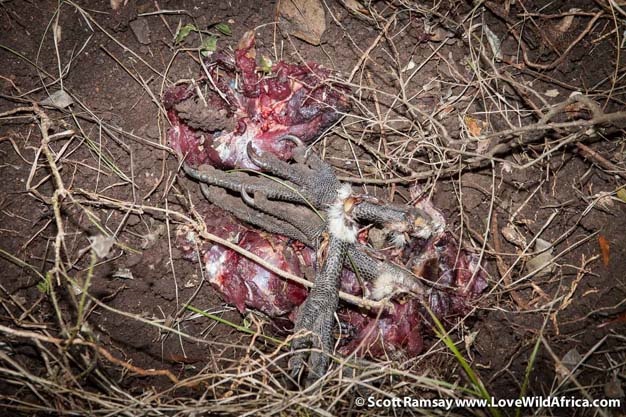
We returned later with anti-poaching rangers, and the vultures’ bodies and heads had been removed. But the birds’ feet remained. The poachers had been watching us, and while we’d gone looking for help, they had taken what they could and ran.
Like elephants, rhinos and lions, vultures in Africa are in dire straits. And while the charismatic species get all the attention, vultures are largely ignored.
In February this year, more than 110 white-backed vultures were poisoned by poachers in Kruger National Park. In October 2015, 46 were poisoned.
“Consider that there are only 3 000 white-backed vultures in Kruger, and only 7 500 in the whole country” said Andre Botha, manager of Endangered Wildlife Trust’s Bird of Prey program, and the co-chair of the IUCN Vulture Specialist Group.
“The Lowveld of South Africa, including Kruger, is the last place vultures survive in any great numbers in the country. There are far fewer of these vultures than rhinos in Kruger, and if the killing continues at the current rate, they will all be gone by 2034.”
There are eleven vulture species in Africa, and all of them are on a downward spiral to extinction. The International Union for Conservation of Nature upgraded four of these species to critically endangered in October 2015.
Fortunately, a potential shoot-out with poachers was avoided as the experienced team leader quickly guided us away from the site.
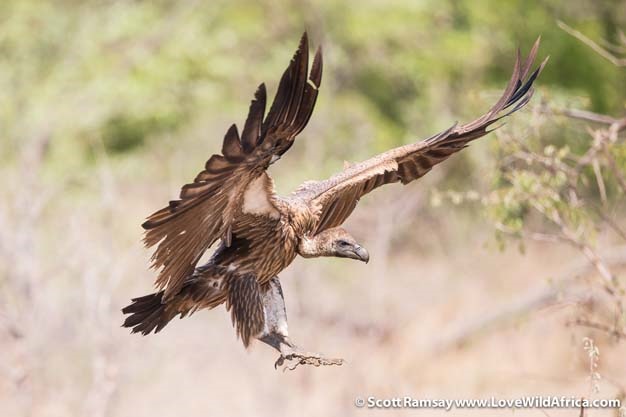
“This means that the white-backed vulture, the hooded vulture, the white-headed vulture and the Ruppel’s vulture are all in imminent danger of disappearing forever.”
Across South Africa, Lesotho and Swaziland, other vulture species are on the way out too. Cape vultures – found only in the region – number about 8 000, lappet-faced vultures about 250, hooded vultures about 200 and white-headed vultures about 160.
“These are cataclysmic figures,” said Botha, who has studied, researched and conserved Southern Africa’s vultures for several years.
“Think about it – there are at most 160 individual white-headed vultures left in the country. It’s tragic, because we know what’s happening, yet most people don’t seem to care about vultures like they do about rhinos or lions.”
Across the rest of Africa, things are no better for these ultimate cruisers of the sky.
Some species of vultures have declined by 70% in the last 30 years. Since the 1980s, 98% of all vultures outside of protected areas in West Africa have disappeared.
In July 2013, more than 600 vultures were found dead at a poisoned elephant carcass in Bwabwata National Park in north-east Namibia.
The steep increase in elephant poaching across Africa has meant bad news for vultures, which can find a carcass within minutes, and will congregate in the sky above the carcass in great numbers.
“Anti-poaching rangers can often be guided to the site of a carcass by the circling of vultures in the sky above” explained Botha. “So as soon as poachers kill an elephant, they will lace the carcass with poison. Within minutes of eating the flesh, the vultures will be dead. This gives poachers enough time to hack off the tusks, which can take up to three hours.”
The widespread use of traditional medicine in Africa also is bad news for vultures. According to some studies, up to four out of five Africans use so-called “muti” to cure ailments, or for other reasons: in the case of vultures, body parts are bought and consumed from traditional healers to improve gambling success and to help see into the future.
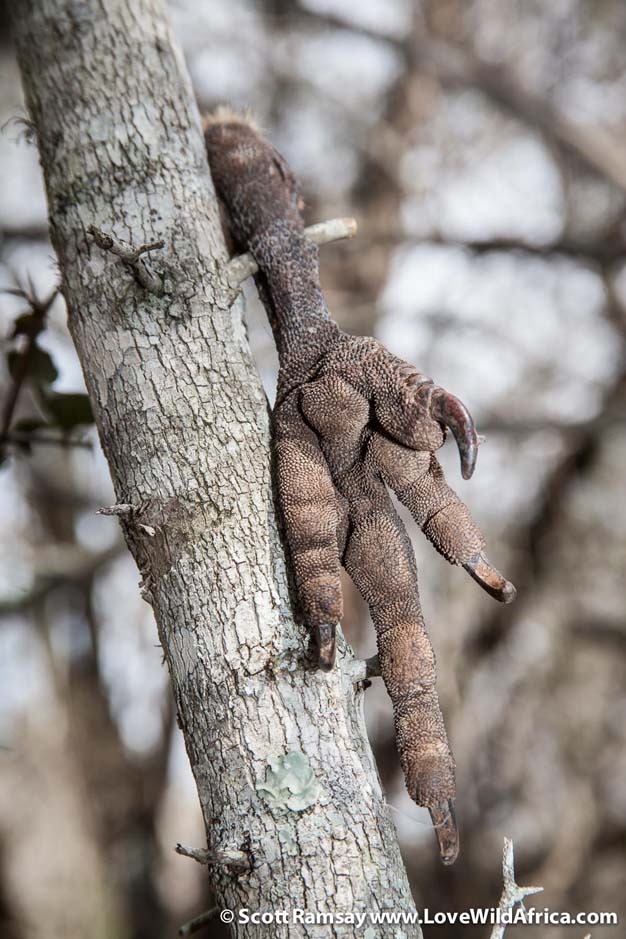
“Because vultures are known to have excellent eyesight, and can see long distances, people think they will get some of that power if they eat part of the body.”
Farmers will also set poisoned carcasses to kill predators like leopard, jackal and caracal, but inadvertently wipe out large numbers of vultures in one go. In South Africa, the agricultural pesticide Temik was once used extensively, but was banned in 2014. Now Carbofuran – banned in Kenya, yet widely available elswhere – is now the poacher’s poison of choice in many parts of Africa.
“Poachers are people who have no moral scruples, and will do anything to earn money,” said Botha. “We live in a largely lawless society, and police forces generally don’t consider dead birds as a priority. So unless we change attitudes among consumers, and unless we reduce the demand for vultures quickly, then things won’t get better.”
And while rhinos and lions are iconic species of Africa, vultures are overlooked. Yet they are arguably more important from an ecological and human perspective.
Vultures are the most efficient consumers of dead, rotting flesh in Africa. Up to 70% of carcasses are consumed not by lions, leopards or jackals, but by vultures. The birds’ stomach bacteria can digest rotting meat that would easily kill a human.
These massive birds provide a free service to human society, especially in rural areas, where other scavengers like dogs, rats and jackals tend to stick around and spread disease. On a continent where medical and municipal services are largely lacking, vultures are invaluable.
And the poisoning of carcasses could also end up killing people who consume vulture body parts.
“Traditional healers need to realize that if someone eats a poisoned vulture, that person could easily die,” said Botha. “And they could be liable for homicide.”
Besides their value to Africa’s human society, these birds are some of the most impressive wildlife on the continent. They fly higher than any other bird – a Ruppel’s vulture was hit by an aeroplane at over 11 000 metres, a height where all other birds would have died from lack of oxygen. And they can fly immense distances, covering more than 1 000 kilometres in one flight.
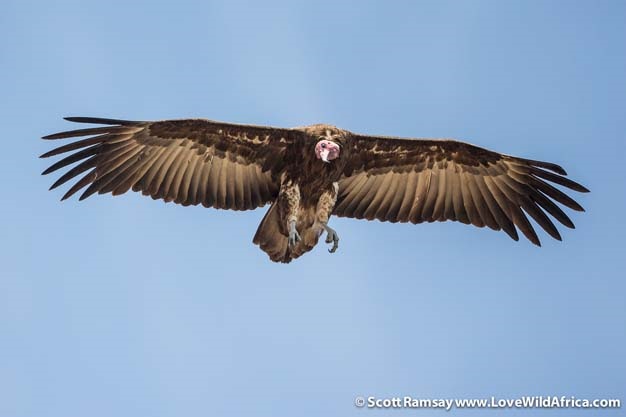
How to make a difference
- Support organisations like Endangered Wildlife Trust (http://www.ewt.org.za), which work intensively to conserve vulture species in Southern Africa, and educate communities and traditional healers about the negative impacts of poaching.
- Report sightings of birds with research tags, and report any dead birds or the use of poisons, to Andre Botha of Endangered Wildlife Trust (andreb@ewt.org.za or 082-962-5725).
- Speak up for vultures. They are more endangered than rhinos or elephants, and their disappearance from Africa is a very real probability. Don’t be silent on this one.
- Educate those in your community. Much like the consumption of rhino horn in Asia as a cure for flu or cancer, the consumption of vulture body parts in the traditional medicine market is driven by superstition, and has no scientifically-proven benefits.
- Visit the national parks and nature reserves which are home to vultures, take photos and share them with your friends on social media. Vultures are impressive creatures! The best places to see them are Kruger National Park (for white-backed, lappet-faced and hooded vultures), De Hoop Nature Reserve (for Cape vultures) and Giant’s Castle Game Reserve in the Drakensberg (for bearded vultures).
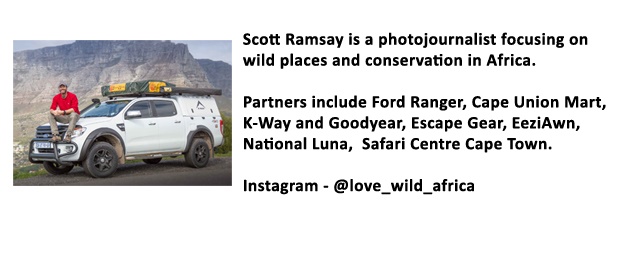
2016-03-29 16:30 - Scott Ramsay
The bushveld of Mkhuze Game Reserve in KwaZulu-Natal is one of South Africa’s last strongholds of wild nature. I had joined a small group of biologists on a field trip, spending several days walking through a remote valley.
Early one morning we encountered a horror scene.
We found several dead white-backed vultures hanging upside down from the branches of some thorn trees. The birds’ intestines had been ripped out, left to rot on the ground. Blood was splattered everywhere. Their feet and heads had been chopped off, and were also dangling from the branches. Despite the humidity and heat, goosebumps quickly covered my body.
The blood was still fresh and the bodies of the vultures were still warm. But it wasn’t just the sight and smell of the dead birds that shocked me. The ground was covered in human footprints. We were being watched, and the poachers were still nearby.

We returned later with anti-poaching rangers, and the vultures’ bodies and heads had been removed. But the birds’ feet remained. The poachers had been watching us, and while we’d gone looking for help, they had taken what they could and ran.
Like elephants, rhinos and lions, vultures in Africa are in dire straits. And while the charismatic species get all the attention, vultures are largely ignored.
In February this year, more than 110 white-backed vultures were poisoned by poachers in Kruger National Park. In October 2015, 46 were poisoned.
“Consider that there are only 3 000 white-backed vultures in Kruger, and only 7 500 in the whole country” said Andre Botha, manager of Endangered Wildlife Trust’s Bird of Prey program, and the co-chair of the IUCN Vulture Specialist Group.
“The Lowveld of South Africa, including Kruger, is the last place vultures survive in any great numbers in the country. There are far fewer of these vultures than rhinos in Kruger, and if the killing continues at the current rate, they will all be gone by 2034.”
There are eleven vulture species in Africa, and all of them are on a downward spiral to extinction. The International Union for Conservation of Nature upgraded four of these species to critically endangered in October 2015.
Fortunately, a potential shoot-out with poachers was avoided as the experienced team leader quickly guided us away from the site.

“This means that the white-backed vulture, the hooded vulture, the white-headed vulture and the Ruppel’s vulture are all in imminent danger of disappearing forever.”
Across South Africa, Lesotho and Swaziland, other vulture species are on the way out too. Cape vultures – found only in the region – number about 8 000, lappet-faced vultures about 250, hooded vultures about 200 and white-headed vultures about 160.
“These are cataclysmic figures,” said Botha, who has studied, researched and conserved Southern Africa’s vultures for several years.
“Think about it – there are at most 160 individual white-headed vultures left in the country. It’s tragic, because we know what’s happening, yet most people don’t seem to care about vultures like they do about rhinos or lions.”
Across the rest of Africa, things are no better for these ultimate cruisers of the sky.
Some species of vultures have declined by 70% in the last 30 years. Since the 1980s, 98% of all vultures outside of protected areas in West Africa have disappeared.
In July 2013, more than 600 vultures were found dead at a poisoned elephant carcass in Bwabwata National Park in north-east Namibia.
The steep increase in elephant poaching across Africa has meant bad news for vultures, which can find a carcass within minutes, and will congregate in the sky above the carcass in great numbers.
“Anti-poaching rangers can often be guided to the site of a carcass by the circling of vultures in the sky above” explained Botha. “So as soon as poachers kill an elephant, they will lace the carcass with poison. Within minutes of eating the flesh, the vultures will be dead. This gives poachers enough time to hack off the tusks, which can take up to three hours.”
The widespread use of traditional medicine in Africa also is bad news for vultures. According to some studies, up to four out of five Africans use so-called “muti” to cure ailments, or for other reasons: in the case of vultures, body parts are bought and consumed from traditional healers to improve gambling success and to help see into the future.

“Because vultures are known to have excellent eyesight, and can see long distances, people think they will get some of that power if they eat part of the body.”
Farmers will also set poisoned carcasses to kill predators like leopard, jackal and caracal, but inadvertently wipe out large numbers of vultures in one go. In South Africa, the agricultural pesticide Temik was once used extensively, but was banned in 2014. Now Carbofuran – banned in Kenya, yet widely available elswhere – is now the poacher’s poison of choice in many parts of Africa.
“Poachers are people who have no moral scruples, and will do anything to earn money,” said Botha. “We live in a largely lawless society, and police forces generally don’t consider dead birds as a priority. So unless we change attitudes among consumers, and unless we reduce the demand for vultures quickly, then things won’t get better.”
And while rhinos and lions are iconic species of Africa, vultures are overlooked. Yet they are arguably more important from an ecological and human perspective.
Vultures are the most efficient consumers of dead, rotting flesh in Africa. Up to 70% of carcasses are consumed not by lions, leopards or jackals, but by vultures. The birds’ stomach bacteria can digest rotting meat that would easily kill a human.
These massive birds provide a free service to human society, especially in rural areas, where other scavengers like dogs, rats and jackals tend to stick around and spread disease. On a continent where medical and municipal services are largely lacking, vultures are invaluable.
And the poisoning of carcasses could also end up killing people who consume vulture body parts.
“Traditional healers need to realize that if someone eats a poisoned vulture, that person could easily die,” said Botha. “And they could be liable for homicide.”
Besides their value to Africa’s human society, these birds are some of the most impressive wildlife on the continent. They fly higher than any other bird – a Ruppel’s vulture was hit by an aeroplane at over 11 000 metres, a height where all other birds would have died from lack of oxygen. And they can fly immense distances, covering more than 1 000 kilometres in one flight.

How to make a difference
- Support organisations like Endangered Wildlife Trust (http://www.ewt.org.za), which work intensively to conserve vulture species in Southern Africa, and educate communities and traditional healers about the negative impacts of poaching.
- Report sightings of birds with research tags, and report any dead birds or the use of poisons, to Andre Botha of Endangered Wildlife Trust (andreb@ewt.org.za or 082-962-5725).
- Speak up for vultures. They are more endangered than rhinos or elephants, and their disappearance from Africa is a very real probability. Don’t be silent on this one.
- Educate those in your community. Much like the consumption of rhino horn in Asia as a cure for flu or cancer, the consumption of vulture body parts in the traditional medicine market is driven by superstition, and has no scientifically-proven benefits.
- Visit the national parks and nature reserves which are home to vultures, take photos and share them with your friends on social media. Vultures are impressive creatures! The best places to see them are Kruger National Park (for white-backed, lappet-faced and hooded vultures), De Hoop Nature Reserve (for Cape vultures) and Giant’s Castle Game Reserve in the Drakensberg (for bearded vultures).

"Education is the most powerful weapon which you can use to change the world." Nelson Mandela
The desire for equality must never exceed the demands of knowledge
The desire for equality must never exceed the demands of knowledge
- Lisbeth
- Site Admin
- Posts: 67388
- Joined: Sat May 19, 2012 12:31 pm
- Country: Switzerland
- Location: Lugano
- Contact:
Animals who need better Public Relations
Animals who need better PR
Samuel Cox has been travelling to Africa for 18 years and spent a year teaching wildlife photography and conservation for African Impact. During this time, he’s become increasingly aware of the blinkered approach most tourists have to African wildlife.
When looking for animals on safari, for example, the Big 5 is always at the top of the list. Underdogs such as the honey badger have won some appreciation, thanks to the internet. But, there are still many other creatures who deserve more attention. You could say they simply need better PR.
Samuel Cox has been travelling to Africa for 18 years and spent a year teaching wildlife photography and conservation for African Impact. During this time, he’s become increasingly aware of the blinkered approach most tourists have to African wildlife.
When looking for animals on safari, for example, the Big 5 is always at the top of the list. Underdogs such as the honey badger have won some appreciation, thanks to the internet. But, there are still many other creatures who deserve more attention. You could say they simply need better PR.
"Education is the most powerful weapon which you can use to change the world." Nelson Mandela
The desire for equality must never exceed the demands of knowledge
The desire for equality must never exceed the demands of knowledge
- nan
- Posts: 26310
- Joined: Thu May 31, 2012 9:41 pm
- Country: Switzerland
- Location: Central Europe
- Contact:
Re: Animals who need better Public Relations
But, there are still many other creatures who deserve more attention
Kgalagadi lover… for ever
https://safrounet.piwigo.com/
https://safrounet.piwigo.com/


